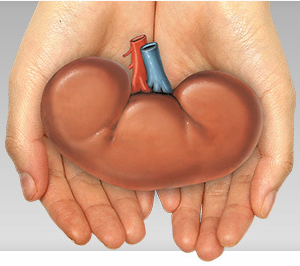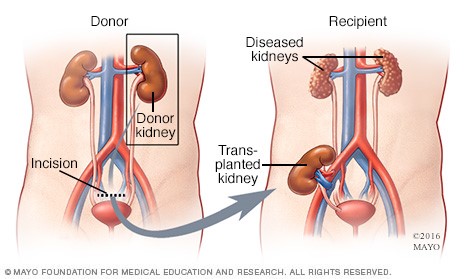
You may need a kidney transplant if you have end stage renal disease (ESRD). This is a permanent condition of kidney failure. It often requires dialysis. This is a process used to remove wastes and other substances from the blood. The kidneys:
Some conditions of the kidneys that may result in ESRD include:

A transplant team carries out the evaluation process for a kidney. The team includes a transplant surgeon, a transplant nephrologist (doctor specializing in the treatment of the kidneys), one or more transplant nurses, a social worker, and a psychiatrist or psychologist. Other team members may include a dietitian, a chaplain, and/or an anesthesiologist. The evaluation includes:
The transplant team will weigh all the facts from interviews, your medical history, physical exam, and tests to determine your eligibility for kidney transplantation. Once you have been accepted as a transplant candidate, you will be placed on the UNOS list. When a donor organ becomes available, you will be notified and told to come to the hospital right away. If you are to get a kidney from a living family member (living-related transplant), the transplant may be done at a planned time. The donor must have a compatible blood type and be in good health. A mental health check will be done to be sure the donor is comfortable with the decision.
Tell your doctor if you have:
Fever and tenderness over the kidney are some of the most common symptoms of rejection. A rise in your blood creatinine level (blood test to measure kidney function) and/or blood pressure may also suggest rejection. The symptoms of rejection may look like other medical conditions or problems. Consult your transplant team with any concerns you have. Frequent visits to and contact with the transplant team are vital.
Avoid places in which you may be exposed to anyone who may be sick. This is because your immune system will be suppressed to protect you from rejecting the new kidney. This will be a lifelong precaution. Your healthcare team may give you other instructions after the procedure, depending on your situation.
To allow the transplanted kidney to survive in your body, you will be given medications for the rest of your life to fight rejection. Each person may react differently to medications. New anti-rejection medications are continually being developed and approved. Your health care team will tailor medication regimes to meet your needs.
Usually several anti-rejection medications are given at first. The doses of these medications may change often, depending on your response. Because anti-rejection medications affect the immune system you will be at higher risk for infections. A balance must be maintained between preventing rejection and making you very susceptible to infection.
Some of the infections you will be especially at risk for include oral yeast infection (thrush), herpes, and respiratory viruses. Avoid contact with crowds and anyone who has an infection for the first few months after your surgery.
WhatsApp us